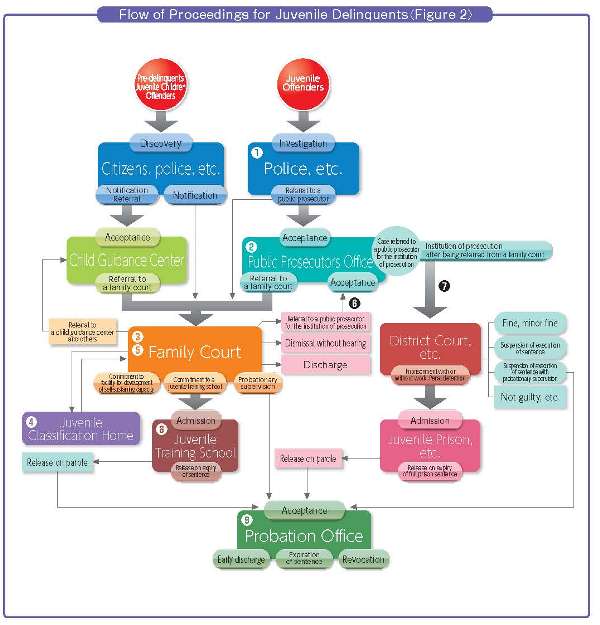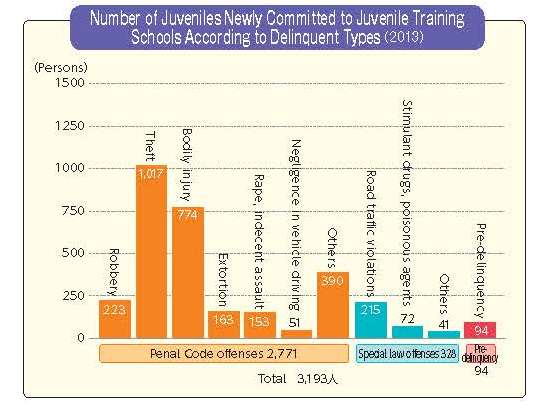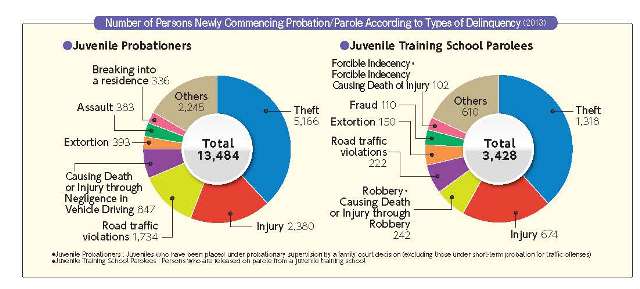Handling Juvenile Crimes and Delinquencies

Flow of Proceedings for Juvenile Delinquents〈Figure 2〉
(1)Police etc.
When juvenile suspects are arrested by the police the cases are transferred to public prosecutors, in principle, after investigations are completed.(2)Public Prosecutors Office
When public prosecutors suspect juveniles of committing crimes, or have good reasons to leave them to the decision of the family court on pre-delinquency (a state in which juvenile delinquents have behavioral problems which may lead to crimes yet stopping short of committing crimes, but highly necessary to be taken into custody), the relevant cases will be transferred to the family court after investigations are completed.(3)Family Court
A family court orders investigators to conduct investigations on relevant juveniles, including their dispositions and family backgrounds, and/or send them to a juvenile classification home for assessment.(4)Juvenile Classification Home
A Juvenile classification home conducts assessment of juveniles based on the expertise of medicine, pedagogy, etc. and submits the results to a family court.(5)Family Court
When a family court considers that a juvenile has no reason to undergo adjudication procedures or that it is not suitable to put him/her to adjudication procedures based on the result of the investigation of his/her dossier etc., the court decides dismissal without hearing. When the court finds it reasonable to take adjudication procedures, it develops the closed-door process for adjudication.If deemed unnecessary to place the juvenile into protective custody as a result of adjudication process based on the investigations and assessment by above-mentioned (3) and (4) respectively, the court declares the juvenile not-to-be discharged. However, if deemed reasonable to place him/her into protective custody, the court decides to place him/her on probation or send him/her to a juvenile training school.
Meanwhile, if the presence of a public prosecutor is necessary for the identification of delinquency in a major crime, a public prosecutor also participates in a hearing under the decision of the family court.
(6)(7)Sending of Juveniles to Public Prosecutors and Indictment
When a family court finds it reasonable to impose criminal punishment on those who have committed a crime that deserves the death penalty, penal servitude or imprisonment, the court sends the case to public prosecutors.When juveniles aged sixteen or older are accused of killing their victims intentionally, the cases are sent to public prosecutors, in principle, and the prosecutors who have accepted the cases must indict them.
(8)Juvenile Training School
Juveniles who are sent to a juvenile training school are placed to either primary, middle, special or medical juvenile training school, where they seek rehabilitation by receiving correctional education etc. Juveniles who are handed a family court judgment to be sent to a juvenile training school are admitted to any of primary, middle, special or medical juvenile training school, where they are supposed to receive correctional education, etc. to reform themselves.※After the enforcement of the new law, the types of juvenile training schools will change as follows: primary and middle juvenile training schools will become TYPE-I juvenile training school, special juvenile training school will become TYPE-II juvenile training school and medical juvenile training school will become TYPE-III juvenile training school, respectively.
(9)Probation Office
Those who are decided by a family court to be placed on probation, or those who are provisionally permitted to be released from a juvenile training school are to receive guidance and assistance from probation officers and volunteer probation officers; they are to pursue rehabilitation and a smooth return to society.
Number of Juveniles Newly Committed to Juvenile Training Schools According to Delinquent Types (2013)

Number of Persons Newly Commencing Probation/Parole According to Types of Delinquency (2013)
